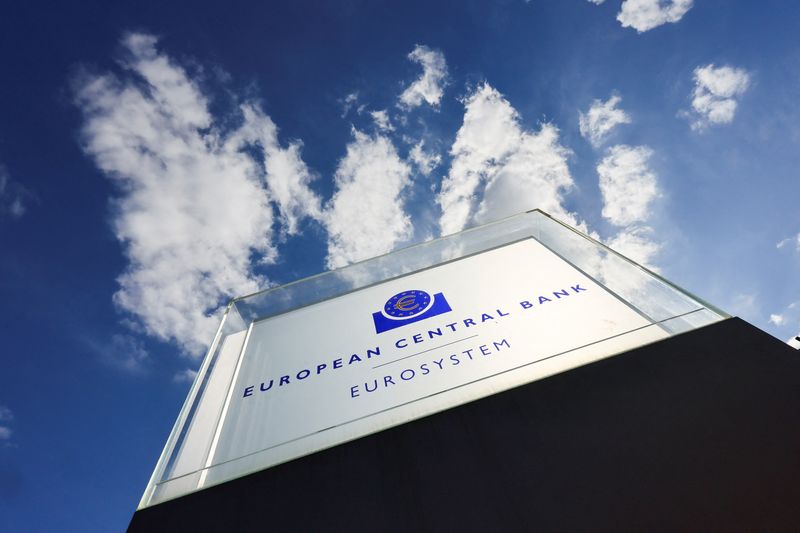By Balazs Koranyi and Francesco Canepa
FRANKFURT (Reuters) – European Central Bank policymakers consider a spike in Italy’s bond yields to be justified by the government’s projection of higher deficits, but see it as a warning sign that should cool talk of ending a bond-buying scheme early, six sources said.
Italian yields jumped last week as investors sold the bonds, widening the gap with safe-haven Germany to a 10-month high, after Prime Minister Giorgia Meloni’s government unveiled plans for sharply higher budget deficits in coming years.
Because higher yields signal a rise in borrowing costs, the selloff has raised questions about the long-term sustainability of Italy’s huge debt pile.
That in turn has prompted some investors and analysts to speculate that the ECB may be forced to jump in to calm markets and avoid so-called fragmentation, where borrowing costs of one euro zone country fall out of sync with others.
But conversations with six sources with direct knowledge of the discussion showed five were in no hurry to intervene because they see Italy’s troubles as resulting largely from its easing of fiscal discipline, and the reaction so far as proportionate.
All the sources spoke on condition of anonymity.
“I think Italy’s troubles are entirely self-inflicted, so the market reaction is quite justified. But there is a lesson for us in that PEPP’s flexibility is valuable that we shouldn’t give up without thorough analysis,” one of the sources said, referring to the ECB’s Pandemic Emergency Purchase Programme.
The ECB has stopped buying new bonds through the 1.7 trillion euro ($1.8 trillion) PEPP scheme, launched at the outset of the COVID-19 outbreak to help support the economy, but has said it will continue to reinvest the proceeds of maturing debt through the end of 2024.
It has tweaked the rules of the scheme so that reinvestments can be skewed towards euro zone countries facing a disproportionate rise in borrowing costs – forming what ECB President Christine Lagarde has called the central bank’s first line of defence in case of turbulence.
Just one of the sources said the current disparity between Italy’s and Germany’s 10-year bond yields, which recently crossed 200 basis points, is approaching a level where buying more Italian bonds via the PEPP may be worth considering.
This was not seen as a more widely held view.
An ECB spokesperson declined to comment.
Meloni has said she is not worried by the rise in yields, saying: “Italy is solid.”
NO RUSH FOR PEPP TALKS
All six sources said the market turmoil could complicate discussions, expected to start soon, on a possible early end to PEPP reinvestments, which some policymakers have argued for as the ECB is now tightening policy to curb inflation pressures.
Most of the sources said there is no hurry to end reinvestments or even to formally open this discussion on the policy-making Governing Council.
The ECB could easily afford to keep the issue on ice until at least next spring, when it should be clearer where inflation is going and whether the bank’s historic tightening cycle has worked as intended, the sources said.
Some argued that PEPP reinvestments should end before any talk of a rate cut, now expected by markets around mid-2024. Others said that modifying the end-2024 date would involve breaking the bank’s guidance, so it is worth debating whether the hit to credibility could be bigger than the benefit.
The ECB’s next line of defence would be the Transmission Protection Instrument, a never-used bond purchase scheme targeting individual countries to ensure that ECB policy is transmitted effectively to all corners of the 20-nation bloc.
But the sources said activating TPI for Italy had not been discussed and in the current context there is little to no case to do so because the scheme is specifically for unwarranted market events.
One source, however, said that should the Italian spread over German debt rise to above 250 basis points – compared with a current 207 basis points – then a discussion about TPI might be more appropriate.
Spreads of Italian 10-year bonds over their German counterparts are up roughly 30 basis points this month in their biggest jump since last December.
(Writing by Balazs Koranyi; Editing by Catherine Evans)
